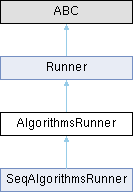 |
Belle II Software development
|
 |
Belle II Software development
|

Public Member Functions | |
| __init__ (self, name) | |
| run (self) | |
Public Attributes | |
| name = name | |
| The name of this runner instance. | |
| list | input_files = [] |
| All of the output files made by the collector job and recovered by the "output_patterns". | |
| list | database_chain = [] |
| User set databases, can be used to apply your own constants and global tags. | |
| list | dependent_databases = [] |
| List of local databases created by previous CAF calibrations/iterations. | |
| str | output_database_dir = "" |
| The directory of the local database we use to store algorithm payloads from this execution. | |
| dict | results = {} |
| Algorithm results from each algorithm we execute. | |
| final_state = None | |
| Final state of runner. | |
| algorithms = None | |
| The list of algorithms that this runner executes. | |
| str | output_dir = "" |
| Output directory of these algorithms, for logging mostly. | |
Static Public Attributes | |
| str | FAILED = "FAILED" |
| failed | |
| str | COMPLETED = "COMPLETED" |
| completed | |
Base class for `AlgorithmsRunner` classes. Defines the necessary information that will be provided to every `AlgorithmsRunner` used by the `framework.CAF` An `AlgorithmsRunner` will be given a list of `framework.Algorithm` objects defined during the setup of a `framework.Calibration` instance. The `AlgorithmsRunner` describes how to run each of the `strategies.AlgorithmStrategy` objects. As an example, assume that a single `framework.Calibration` was given and list of two `framework.Algorithm` instances to run. In this example the chosen :py:meth:`AlgorithmsRunner.run()` is simple and just loops over the list of `caf.framework.Algorithm` calling each one's :py:meth:`caf.strategies.AlgorithmStrategy.run()` methods in order. Thereby generating a localdb with the only communication between the `strategies.AlgorithmStrategy` instances coming from the database payloads being available from one algorithm to the next. But you could imagine a more complex situation. The `AlgorithmsRunner` might take the first `framework.Algorithm` and call its `AlgorithmStrategy.run` for only the first (exp,run) in the collected data. Then it might not commit the payloads to a localdb but instead pass some calculated values to the next algorithm to run on the same IoV. Then it might go back and re-run the first AlgorithmStrategy with new information and commit payloads this time. Then move onto the next IoV. Hopefully you can see that while the default provided `AlgorithmsRunner` and `AlgorithmStrategy` classes should be good for most situations, you have lot of freedom to define your own strategy if needed. By following the basic requirements for the interface to the `framework.CAF` you can easily plugin a different special case, or mix and match a custom class with default CAF ones. The run(self) method should be defined for every derived `AlgorithmsRunner`. It will be called once and only once for each iteration of (collector -> algorithm). Input files are automatically given via the `framework.Calibration.output_patterns` which constructs a list of all files in the collector output directories that match the output_patterns. If you have multiple types of output data it is your job to filter through the input files and assign them correctly. A list of local database paths are given to the `AlgorithmsRunner` based on the `framework.Calibration` dependencies and any overall database chain given to the Calibration before running. By default you can call the "setup_algorithm" transition of the `caf.state_machines.AlgorithmMachine` to automatically set a database chain based on this list. But you have freedom to not call this at all in `run`, or to implement a different method to deal with this.
Definition at line 27 of file runners.py.
| __init__ | ( | self, | |
| name ) |
Definition at line 71 of file runners.py.
|
inherited |
Reimplemented in SeqAlgorithmsRunner.
Definition at line 22 of file runners.py.
| algorithms = None |
The list of algorithms that this runner executes.
Definition at line 89 of file runners.py.
|
static |
completed
Definition at line 69 of file runners.py.
| list database_chain = [] |
User set databases, can be used to apply your own constants and global tags.
Definition at line 79 of file runners.py.
| list dependent_databases = [] |
List of local databases created by previous CAF calibrations/iterations.
Definition at line 81 of file runners.py.
|
static |
failed
Definition at line 67 of file runners.py.
| final_state = None |
Final state of runner.
Definition at line 87 of file runners.py.
| list input_files = [] |
All of the output files made by the collector job and recovered by the "output_patterns".
Definition at line 77 of file runners.py.
| name = name |
The name of this runner instance.
Definition at line 75 of file runners.py.
| str output_database_dir = "" |
The directory of the local database we use to store algorithm payloads from this execution.
Definition at line 83 of file runners.py.
| str output_dir = "" |
Output directory of these algorithms, for logging mostly.
Definition at line 91 of file runners.py.
| dict results = {} |
Algorithm results from each algorithm we execute.
Definition at line 85 of file runners.py.